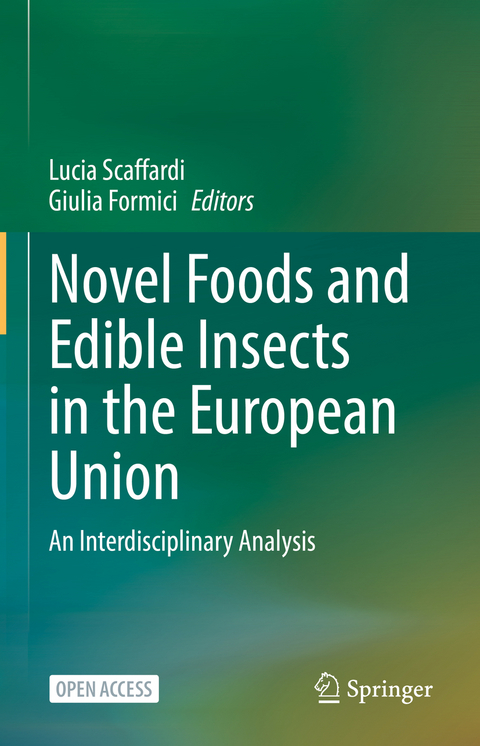
Novel Foods and Edible Insects in the European Union
Springer International Publishing (Verlag)
978-3-031-13493-7 (ISBN)
Giulia Formici currently is Research Fellow (RTD/A) in Public Comparative Law at the University of Milan La Statale, Department of Italian and Supranational Public Law. After completing her Ph.D. studies, she has been awarded a post-doc grant at the University of Parma, funded by Region Emilia-Romagna (Program "High Competencies"), based on a project, proposed by Professor Scaffardi, specifically focused on the regulatory issues related to Novel Foods and, in particular, to edible insects and cultured meat. She participated as a speaker in numerous conferences, talking about the legal challenges linked to Novel Foods, edible insects, traditional foods coming from Third Countries, cultured meat and food sustainability. She published various papers on Novel Foods exploring different perspectives and regulatory issues, and she has been recently awarded the "SIRD Younger Comparatists 2022" prize with a paper specifically addressing the strict link between right to food, cultural identity, sustainability, and food divide. She taught a specific module on Innovation in the Agri-Food Sector, as an integrative course of the European Union Agri-food Law course, held at the Bachelor Course in Food System: Sustainability, Management and Technologies, University of Parma (Faculty of Economics). She is also a member of the Coordinated Research Centre for Innovation, Well-being and Environment (CRC I-WE) of the University of Milan. Other research areas covered by Giulia's studies are data retention, fundamental rights and mass surveillance systems for security purposes, biometric data and digital welfare state. Lucia Scaffardi is Full Professor in Public Comparative Law at the University of Parma, Department of Law, Politics and International Studies, where she teaches Public Comparative Law and Italian and Comparative Constitutional Law. Lucia's main research fields cover different areas, from DNA databases for investigative purposes to biometric data as law enforcement tools, from hate speech to GMOs. In 2016 she started focusing her attention on food law and, in particular, on the impact of new technologies on the food sector, considering food safety and sustainability issues together with specific legislative and regulatory challenges. She is author of numerous papers related to Novel Foods and co-editor of a two-volumes' Conference-proceedings titled "Food Law. A Comparative Perspective". She participated as a speaker in numerous national and international conferences related to food law and Novel Foods and she recently organized two interdisciplinary Webinars, the first one on Novel Foods and edible insects and the second one on cultured meat, involving colleagues of the University of Parma and of other European Universities, together with business operators and EFSA's representatives. She also co-organized a Workshop on food sustainability, promoted by the School of Advanced Studies on Food and Nutrition of the University of Parma. She obtained fundings for the realization of several projects in the field of food law, among which funds concerning the realization of studies on food law in a comparative perspective and funds related to the Emilia-Romagna Region Call "High Competences", with a project specifically devoted to Novel Foods legal issues. She is member of the University Center for Bioethics (UCB) and the Center for Studies in European and International Affairs (CSEIA), both established at the University of Parma; Lucia is also senior member of the Coordinated Research Centre for Innovation, Well-being and Environment (CRC I-WE) of the University of Milan.
- Introduction: Feeding the Future Sustainably-What Role for Novel Foods and Edible Insects?. - Part I Novel Foods: A Necessary Premise. - Novel Foods in the EU Integrated Administrative Space: An Institutional Perspective. - A Peculiar Category of Novel Foods: Traditional Foods Coming from Third Countries and the Regulatory Issues Involving Sustainability, Food Security, Food Safety, and the Free Circulation of Goods. - Food (In)Security: The Role of Novel Foods on Sustainability. - Why 'New' Foods Are Safe and How They Can Be Assessed. - Part II Edible Insects. - Legislative and Judicial Challenges on Insects for Human Consumption: From Member States to the EU, Passing Through the Court of Justice of the EU. - The Safety Assessment of Insects and Products Thereof As Novel Foods in the European Union. - Consumer Perceptions and Acceptance of Insects As Feed and Food: Current Findings and Future Outlook.
| Erscheinungsdatum | 21.09.2022 |
|---|---|
| Zusatzinfo | XII, 169 p. 1 illus. |
| Verlagsort | Cham |
| Sprache | englisch |
| Maße | 155 x 235 mm |
| Gewicht | 433 g |
| Themenwelt | Recht / Steuern ► EU / Internationales Recht |
| Technik ► Lebensmitteltechnologie | |
| Wirtschaft ► Volkswirtschaftslehre ► Makroökonomie | |
| Schlagworte | circular economy • Consumers' Perception • Edible Insects • EFSA • EU Food Market • EU Novel Food Regulatory Framework • EU Regulation 2015/2283 • Food law • Food Safety • Innovation in the Agri-Food Sector • novel foods • open access • sustainability • Sustainable Food Chain |
| ISBN-10 | 3-031-13493-1 / 3031134931 |
| ISBN-13 | 978-3-031-13493-7 / 9783031134937 |
| Zustand | Neuware |
| Haben Sie eine Frage zum Produkt? |
aus dem Bereich


